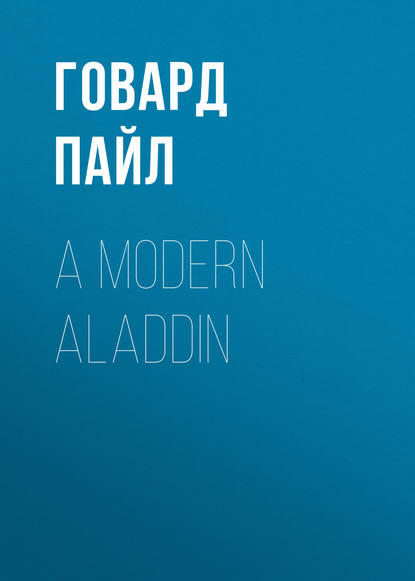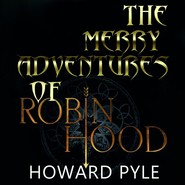По всем вопросам обращайтесь на: info@litportal.ru
(©) 2003-2024.
✖
A Modern Aladdin
Настройки чтения
Размер шрифта
Высота строк
Поля
"I do not know," said Oliver. And he hid his face in his trembling hands.
The Count de St. Germaine, without removing his eyes from his victim, took another deep, luxurious pinch of snuff. Then he shut the lid with a snap, and slipped the box again into his pocket, but all that time his eyes never once moved from the cowering Oliver. Suddenly he burst out laughing, and clapped the lad upon the shoulder. "I will tell you what I will do to you, Oliver," said he; "I will forgive you! Do you hear me? I will forgive you!"
Oliver slowly removed his hands from his face, and looked up with dumb bewilderment. "You forgive me?" he repeated, stupidly.
"Yes, I forgive you."
A long pause of silence followed, during which Oliver looked intently and earnestly into that smiling face, so close to his own. That smiling face – it was an impenetrable mask, it was the face of a sphinx, and Oliver might almost as well have tried to read the one as the other. Yet there was a soul behind it, and that soul could not entirely be hidden; one glimpse of it flashed out through the eyes. Oliver saw it and shuddered.
"You forgive me?" he repeated. "What do you mean? I do not comprehend. What would you have me do?"
The other shrugged his shoulders and raised his eyebrows. "What would I have you do?" said he. "You surprise me! I talk to you, and you do not seem to hear me. I say that I forgive you, and you do not seem to understand. What I mean is that you shall continue to live here, as you have already done, in an atmosphere of happiness and love. It is beautiful, as all Paris says; it is delightful! After all, I cannot punish you, for I have not the heart to interfere with it. By-and-by you shall marry Mademoiselle Céleste."
Oliver never removed his looks from the other's face. "Marry Céleste?" he murmured, mechanically.
"Certainly," said the other, "I never saw you so dull. I said that you were to marry Mademoiselle Céleste – to marry her. But, there! I see what it is. You are not yet recovered from your illness in Madame de Pompadour's salon. It was indeed insufferably hot. Poor lady! she is like a green cockatoo, she cannot abide a touch of cold. But I weary you; I will take another opportunity of visiting you. But remember, my dear Oliver, I forgive you. Au revoir!"
He was gone; and Oliver sat as Monsieur de St. Germaine had left him, clad in his dressing-gown, and seated upon the edge of the sofa, leaning with his elbows upon his knees, his hands clasped before him, and his eyes fixed dully upon the floor. Forgive him! His soul told him that he need expect no forgiveness from that cold, iron heart. What should he do? How should he escape the fate which he felt was hanging over him? The master had said that he was to marry Céleste. Upon the eve of that marriage, perhaps, he would come and proclaim him the cheat, the charlatan that he was. He shuddered as he pictured the shame of the humiliation of such a disclosure. Suddenly a thought flashed upon him, like light upon the darkness: why not tell Céleste his story? Why not confess all to her, and throw himself upon her mercy? His shame would be less, and she would scorn him less, than if he waited for the Count de St. Germaine to expose him. His heart stood still at the thought of Céleste's grief and despair. And Paris! How Paris would laugh at the denouement of that romance which it now petted and approved. In a sudden rush of determination, and without giving himself time for second thought, he drew paper and ink towards him, and set himself to write a letter to Céleste. It was a blundering, blotted letter. It took him a long, long time to write it, but at last it was done; in it he told her all; and then, still without giving himself time to think, he rang the bell, and Henri appeared. He hesitated, for one last moment, with a shrinking heart.
"What will monsieur have?" said Henri.
"Take this letter," said Oliver, with one last, desperate resolve,"to Mademoiselle Céleste, and – and wait her answer."
"Yes, monsieur."
Oliver watched the man as he crossed the room, as he noiselessly closed the door; he was gone.
How long the answer was in returning Oliver never could tell. It might have been only a few minutes that he walked up and down the room. It seemed to him hours.
"Monsieur, a letter."
Oliver turned sharply. It was Henri, and he presented upon his tray a little note. It was, as far as outward appearance was concerned, almost exactly like those two others upon the table; but what was within? Oliver hardly dared touch it. He opened it slowly, hesitatingly; there were only three words, "I love you" – that was all. Yes, that was all. Oliver sat looking at it with eyes that blinded more and more, until at last one hot drop fell with a pat upon the open sheet. Then even Henri's presence was not enough to inspire self-control. He broke down, and began crying, and probably, if Henri thought anything at all, it was that there had been a quarrel.
Scene Third. —The grand salon of the Hôtel de Flourens; the hour, near midnight. Oliver is discovered walking rapidly and agitatedly up and down the length of the great room, still illuminated by a thousand and one candles
And now the last guest has been gone for some time, the last huge unwieldy coach has rumbled away, and the dull silence seems to hum and buzz after the clatter of the afternoon and night. He is married. Oliver is still bewildered. He is like one in a dream; he only half knows what he does and says; he only half senses what he sees and hears; his heart thrills almost agonizingly with joy and triumph. Céleste is his, his very own, his wife; and what is more, it has been arranged that he and she are to depart for Flourens – dear, sweet, beautiful Flourens – the very next morning.
Some days before, Oliver had proposed the departure to the marquis, and the marquis had made no objection. He had made but one stipulation, that he himself should remain in Paris.
"There are many matters of business to attend to," he had said. "We have as yet been able to dispose of only a minute portion of our diamonds. The amount we have realized upon them has been enormous, yet it is only a drop or two taken from the bucket."
It had been arranged that Oliver was to see the marquis upon some final business that very night, and so it is that he is now discovered walking so impatiently up and down the empty room at that hour, his heart thrilling with joy and delight. But through all Oliver's joy and delight there ran every now and then a discordant pang of uneasiness, for suddenly, in spite of himself, his thoughts would flash back upon the memory of the master, and under that vivid sinister flash of recollection his soul shrank and trembled within him. Twelve hours still stretched between him and that time of departure. What might not happen in twelve hours?
"Twelve hours," muttered Oliver to himself. "I would give all my diamonds if they were passed and gone." He thought of Céleste, and a keen thrill pierced through his heart; he thought of the master, and another keen thrill – this time heart-sickening – shot through him as the other had done. "No matter," he muttered to himself, "the morning will soon come and we will be miles away, with nothing to fear and with nothing to think of but our love." He pressed his face against the window and looked out into the night, then he turned and pulled out his watch impatiently and looked at it; it was ten minutes of twelve. "I wish he would make haste," he muttered.
As though in answer to his impatient murmur, the door opened and a servant announced that the marquis was ready to see him now in his closet.
Oliver found him seated at his escritoire, with books and papers spread out before him. He took the chair that the marquis indicated, and then the marquis began talking to him. Oliver did not know what he was saying; whenever the other would pause for a reply, he would say, "Yes, yes, that is so," or, "I think not," as the words seemed to demand; sometimes he understood what was said, but more generally it might as well have been spoken in Greek.
"Then," said the marquis, "if I understand correctly, you are entirely satisfied with my management of your affairs?"
Oliver was beginning to grow weary of this business. "Yes," said he, restlessly, "yes, I am entirely satisfied. Manage them as you choose; I do not care; it is of no importance."
The marquis opened his arms. "Embrace me!" he cried. "You are generosity itself; I admire generosity! Your confidence in me touches me. You must know, Oliver, that I manage most discreetly. We have lived here, as you are aware, without stint or economy – it would have been wrong for me to limit that generosity of yours which I so much admire – but yet I have not been extravagant; for not only have we maintained the establishment here in Paris, but we have also paid off the debts upon it, as well as upon Flourens. Yes, Flourens is freed; and I – I am not to be outdone in generosity; those ancestral estates of Flourens that have been in the hands of our family for generations" – he waved his hand – "I give them to you, Oliver, and to Céleste for your own."
"I thank you," said Oliver.
The marquis paused for a moment; his own generosity moved him profoundly. "But I was about to say," continued he, presently, "that the reason more especially why I called you here was to let you see how few of our diamonds have been disposed of. I will show you."
"I do not care to see," said Oliver.
"Pardon me," said the marquis, "but you must see them, my dear Oliver. It is business. Look! yonder is the chest of diamonds. I have had it brought here to-day not only to show you how little of the contents we have as yet disposed of, but also because I expect three merchants from Amsterdam to visit me to-morrow and inspect the gems. They write to me that they have formed a company for the purchase of a quantity of them."
While he was speaking he had taken a bunch of keys from a secret compartment of the escritoire. One of them was the key of the chest. He thrust it into the lock, drew back the bolts, and opened the lid. "You see," said he, "there is not one-tenth of this first tray of diamonds that we have as yet disposed of." Oliver glanced indifferently at them. "The rest of the trays," continued the marquis, "have not yet been touched. I will show them to you."
"I do not care to see them," said Oliver; "I will take your word for it. If there is nothing further that you care to speak to me about, I would like to be excused; there are many things that I have to prepare for my journey."
"Ah!" said the marquis, "I see these dull affairs of business, they are of no interest to you. Youth is so impetuous! It is better," said he, as he locked the chest and replaced the keys in the secret compartment of his escritoire – "it is better to possess youth and love than all the wealth and gems of the Indies. Go, my dear Oliver, and trust in me. I will manage your affairs, my child, as though they were my own."
Oliver did not wait for a second bidding; he flew from the place and the tiresome talk of diamonds and business. As he was about to enter the room which he had left only a little while before, he hesitated for a moment, he knew not why. A sudden pang shot through him, and he pressed his hand to his bosom. That instant a clock rang out sharply in the silence. He counted the twelve strokes, and then opened the door.
Some one stood looking out of the window, his face close to the glass. He wore a long black cloak, beneath which he carried a large oval frame of some sort. Oliver walked mechanically up the room, and as he advanced that other turned slowly towards him. Oliver's heart gave a great bound, and then stood quite still within him. The next instant every grain of strength seemed to slip away from him; his knees grew suddenly weak and smote together; his hands dropped with a leaden heaviness to his sides, and his tongue clave to the roof of his mouth. It was the master!
A moment or two of dead silence followed, and in the heavy, breathless stillness the sharp ticking of a clock sounded with piercing distinctness upon Oliver's tensely-drawn nerves. The master said not a word, but he looked upon him with a cool, contained smile of ineffable complacency.
At last, somehow, Oliver found his voice. "You!" he said, hoarsely; and then again, with a gulp: "You! How came you here?"
The Count de St. Germaine laughed. "How came I here? I walked here. That does not satisfy you? Well, no matter. I have, as you may know, many, very many, ways of coming and going as I choose. Just now it is sufficient that I am here."
"And for what have you come?" said Oliver, in that same slow, hoarse voice.
For a while the master leaned against the deep window-casing, and looked at him from under his brows, his eyes burning like green sparks.
"For what did I come, Oliver?" said he at last. "I will tell you. You must know that I have a silly habit of keeping my promises. Did I not make you the richest man in France? Did I not teach you the secret of the water of wealth? Did I not teach you all that you know, and make you all that you are? Very good. By so doing I fulfilled one part of a promise I some time made you. Now I have come to fulfil the other part. I promised you then that should you ever return to Paris I would ruin you; I am going to ruin you. I promised that I would crush you; I am about to crush you. I promised to make your life a hell; I will make it a hell. I will make you wish a thousand times that you had never been born. When I first met you in Madame de Pompadour's salon, I read in your face your fear that I would betray you. Ah, no! that would have been childish; it would have been petulant; it would have been impatient and premature. No, Oliver; I have waited until now, and what do you think I have waited for?"
Oliver's lips moved, but he could not answer. He stood leaning with his hand upon the side of the table, stunned and dizzied. He felt as though every word that the master spoke struck a leaden blow upon his heart. But the other did not wait for a reply. He flung back his cloak, and brought forth that which he carried beneath it. It was the magic mirror, upon the face of which was drawn the sign that, as Oliver knew, stood between his master and his supernatural power.
The master stood it upon the table beside Oliver, and then, brushing the dust from his hands, turned a smiling face upon his victim.
"You cannot guess?" said he, returning to the question he had asked. "Ah, well, it does not matter. I will tell you. I intend to pierce your heart through that young wife of yours, Oliver."
The words struck upon Oliver's ears like a blow, and like a blow shattered into fragments the dull, heavy, icy despair that rested upon him.
"My wife!" he cried. "My wife! Oh God! You devil! You at least shall die!" His dress-sword hung at his side, and as he spoke he flashed it out.
But the Count de St. Germaine only laughed. "Come," said he, "we are silly; we are childish. Do you think, then, that I am afraid of your sword? Ha!"
As he uttered the exclamation he struck his hands sharply together, and it seemed to Oliver as though the blow had fallen upon him physically. Sparks of fire danced before his eyes; for a few seconds his head spun like a teetotum, and the objects in the room flew around him in a dizzy horizontal whirl. Suddenly the whirling stopped, and as his brain recovered from its confusion, he saw before him again the pale, smiling face of the master. He still held his sword in his hand, but he was powerless. It was as though a leaden weight hung upon his will. He could move neither hand nor foot.












